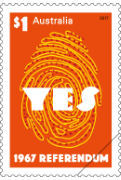Aboriginal timeline: Politics
Found 175 results for your search. Showing page 8 of 9.
2015
-
Nunukul-Nughi woman Leeanne Enoch is set to become the first Aboriginal woman elected to Queensland Parliament.
-
Malcolm Turnbull becomes Australia’s 29th Prime Minister, after launching an all-or-nothing leadership challenge against Tony Abbott, the self-declared “prime minister for indigenous affairs”.
-
West Australian Aboriginal MP Ken Wyatt becomes the first Aboriginal Member of Parliament to reach the frontbench working as Assistant Health Minister.
-
Australia appears before the United Nations Human Rights Council’s 2nd Working Group on the Universal Periodic Review.
2016
-
Several Aboriginal politicians are elected:
- Malarndirri McCarthy (Australian Labor Party) is elected to the Senate for the Northern Territory.
- Patrick Dodson (Australian Labor Party) is selected to represent WA in the Senate.
Aboriginal politicians elected to the Northern Territory Legislative Assembly:
- Lawrence Costa (Territory Labor), representing the seat of Arafura.
- Yingiya Mark Guyula (Independent), representing the seat of Nhulunbuy.
- Chansey Paeche (Territory Labor), representing the seat of Namatjira.
- Selena Uibo (Territory Labor), representing the seat of Arnhem.
- Ngaree Ah Kit (Territory Labor), representing the seat of Karama.
John Ah Kit and his daughter Ngaree Ah Kit are now the first Aboriginal father and daughter to serve in any state parliament, having both been elected to the Northern Territory Parliament.
-
A record number of 13 Aboriginal candidates run for the federal election: Linda Burney (electorate: Barton, NSW), Ken Canning (Sydney, NSW), Pat Dodson, Jacqui Lambie (TAS), Sharlene Leroy-Dyer (Senate, NSW), Kerryanne Liddle (Senate, SA), Joanna Lindgren, Carol Martin, Malarndirri McCarthy (NT), Kado Muir, Tammy Solonec (Swan, WA), Shea Taylor (Senate, QLD), Ken Wyatt (Hasluck, WA).
-
Linda Burney becomes the first female Aboriginal MP in Australia’s history after claiming the Federal seat of Barton. She is the first female Aboriginal MP in the House of Representatives.
-
Northern Territory general election - The Yolgnu Nations Assembly selects Yingiya Mark Guyula as an independent candidate who promotes a treaty with the government.
2017
-
Ken Wyatt is appointed Minister for Aged Care and Indigenous Health, making him the first Aboriginal federal minister. It makes Mr Wyatt not only the first Aboriginal Australian elected to the House of Representatives and first to the frontbench, but also the first to lead a major portfolio.
-
June Oscar AO, a Bunuba woman from Fitzroy Crossing, WA, starts her 5-year term and becomes the first female Aboriginal and Torres Strait Islander Social Justice Commissioner of the Australian Human Rights Commission.
-
UN Special Rapporteur on the rights of indigenous peoples, Victoria Tauli-Corpuz, presents her preliminary report on the human rights situation of Aboriginal people.
-

The stamp overlays two fingerprints and the iconic 'Yes' that marked the campaign. An Australia Post stamp commemorates the 50th anniversary of the 1967 referendum. On 27 May 1967, Australians voted to change the constitution to empower the federal government to make legislation for Aboriginal people, in the same way it could for all other Australians, and to include Aboriginal people in the census.
The stamp combines contemporary dot art elements and curved lines to form a symbol of two fingerprints merging to form one. The word "Yes" in the iconic referendum-campaign font symbolises strength in unity and what has been thus far achieved.
-
Teenager and Gumbaynggirr woman Aretha Brown is chosen by 60 peers as the first female Aboriginal Youth Prime Minister of Australia at the National Youth Parliament in Canberra. In this role she meets Prime Minister Malcolm Turnbull, Opposition leader Bill Shorten and the Governor General Sir Peter Cosgrove.
-
Australia’s peak union body, the Australian Council of Trade Unions, establishes the First Nations Workers’ Alliance (FNWA) to represent participants of the Community Development Programme. (CDP). The CDP employs jobless people in remote Australia at conditions very different to urban areas, and more than 80% of its participants are Aboriginal.
-
Greens’ Lidia Thorpe defeats Labor’s Clare Burns in a seat the party had held for 90 years to become the first Aboriginal woman to be elected to the Victorian parliament.
-
Australian Labor Party member Cynthia Lui becomes the first Torres Strait Islander elected to office during the Queensland state election by winning the Cook electorate.
2018
-
Vonda Malone is named the inaugural McKinnon Emerging Political Leader of the Year by a judging panel including former prime ministers. They recognise Malone, who became the first female mayor of the Torres Shire Council in 2016, for her work in finding community-led solutions for critical issues in the Torres Strait Islands, such as waste management, housing shortages and healthcare.[1]
-
Scott 'ScoMo' Morrison becomes Australia's 30th Prime Minister.
2019
-
The Coalition of Peaks enters a historic formal partnership agreement on Closing the Gap with the Council of Australian Governments (COAG). It sets out shared decision making and joint actions over the next ten years to help improve the lives of Aboriginal people.
The agreement means that for the first time Aboriginal people, through their community-controlled peak organisations and members, are sharing decisions with governments on Closing the Gap, under a formal arrangement.
-
A federal election confirms the Liberal/National Coalition and Prime Minister Scott Morrison for another term.
References
View article sources (0)
[16907] Reconciliation News, Issue 40, October 2018
